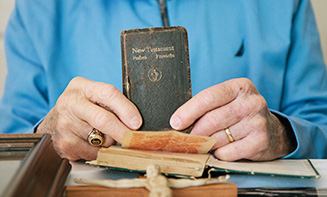By
A smoky haze filled the North Korean forest. Minutes earlier, a barrage of mortar rounds struck the area, each one as deafening as it was destructive. William and his platoon were on the receiving end, and they were frantically trying to regroup. It was just before dawn and visibility was poor, but they could see soldiers moving in their direction. Whether they were friend or foe, it was impossible to tell. As they peered through the trees, one G.I. panicked and shouted, “Don’t shoot! We’re G.I.s!”
His cry was answered by the unmistakable sound of a machine gun bolt slamming forward. The noise gave William chills. He knew what that meant. “I immediately turned left and started up the face of the mountain,” he remembered. “I only got six or eight feet up before an extended burst of bullets sprayed the area. I felt a sharp pain in my right foot and knew I had been hit.” He stumbled, but two of his men grabbed him under the shoulders, and together they escaped up the rocky slope.
When William looked back, all of the G.I.s behind him were dead.
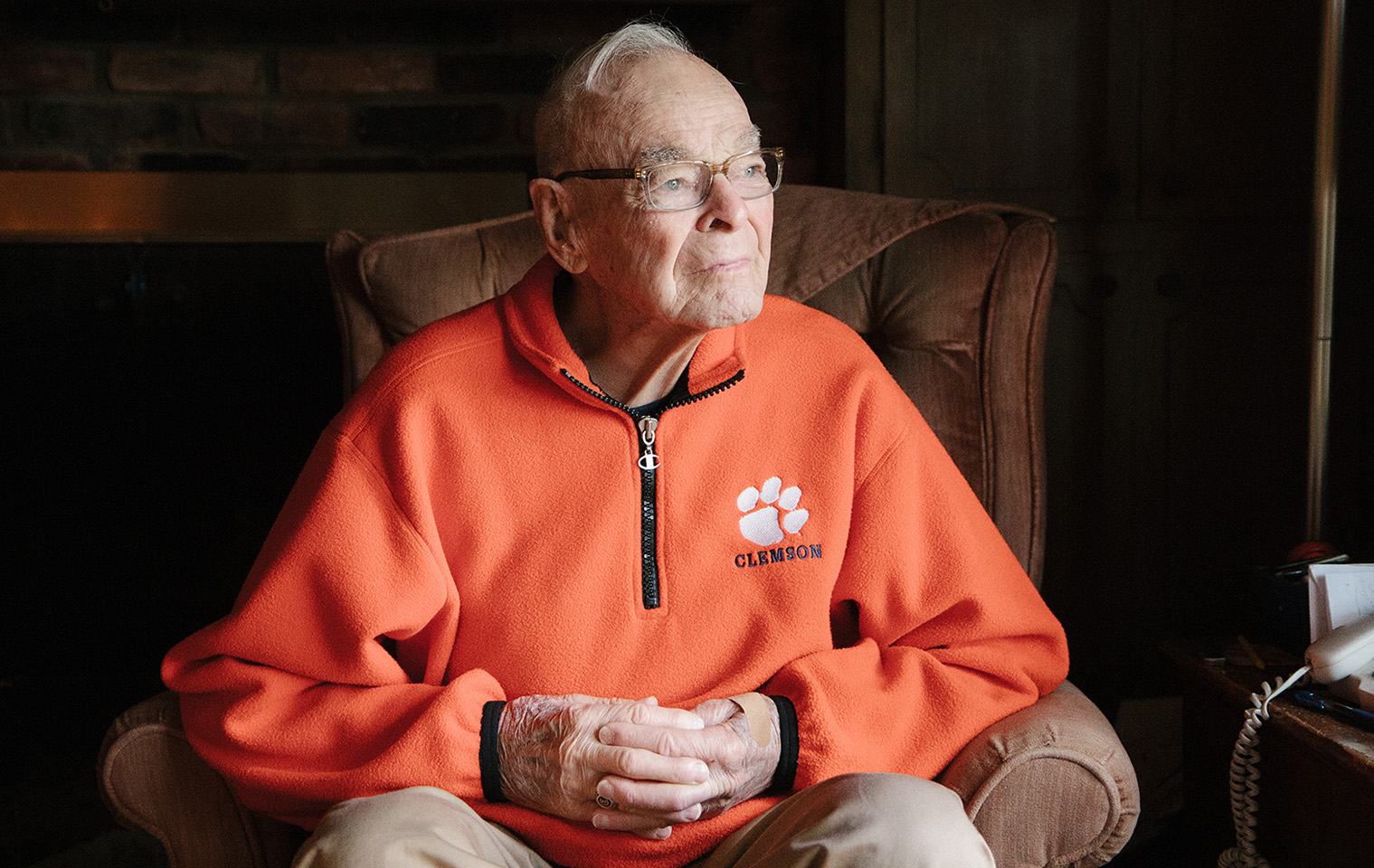
William Funchess grew up on a farm in Orangeburg County, South Carolina. The oldest of three children, his boyhood days were largely spent helping his father maintain their massive fields of cotton, corn, and peanuts. The work was hard, but rewarding, and William enjoyed it so much he planned to study agronomy in college.
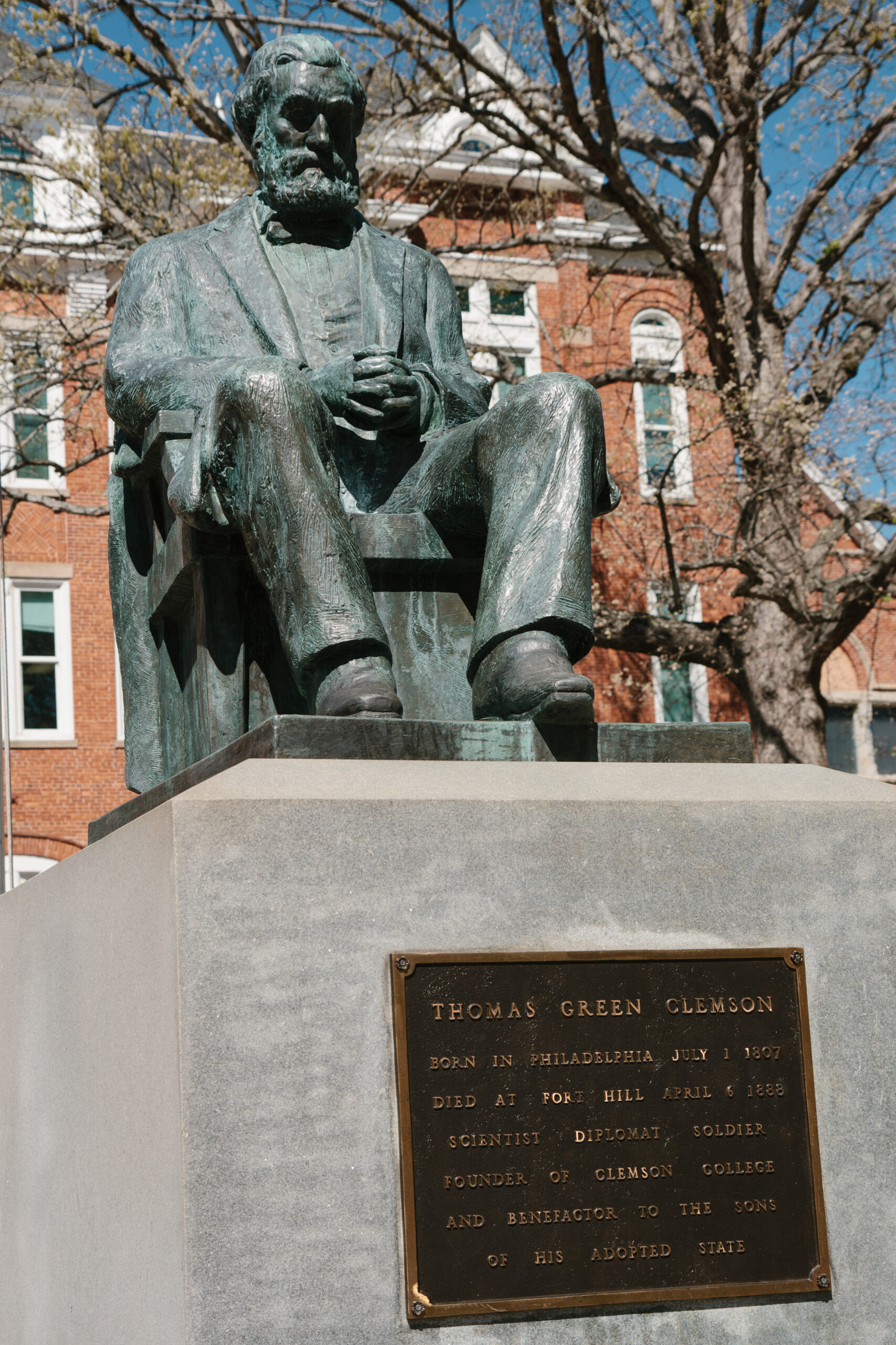 Statue of Thomas Green Clemson, founder of the college known today as Clemson University
Statue of Thomas Green Clemson, founder of the college known today as Clemson UniversityHe decided to attend Clemson College, a military college since its founding in 1889. By the time William graduated high school in 1944, the United States was assisting its allies in the Second World War, and William was unsure if he would be drafted before completing his education. So, he joined the Reserved Officers’ Training Corps program and received his first taste of military life.
In 1948, William received his diploma along with a commission as 2nd Lieutenant in the United States Army and an assignment to Fort Jackson. Shortly after, he was reassigned to a base in Japan. He was newly married to his high school sweetheart, Sybil, and the two were excited to embark on the adventure together.
But on Sunday, June 25, 1950, some 90,000 North Korean troops pushed across the 38th parallel, and the United States was once again called to war. William was on amphibious maneuvers near the southernmost island of Japan. He was immediately ordered back to base, and on July 4, the 19th Infantry Regiment boarded a Landing Ship Tank (LST) and set sail for Korea. “I thought it was only a police action,” said William. “On the LST we were happy, jubilant even. We thought, ‘we’ll be home in three or four weeks.’”
It didn’t take long after disembarking in South Korea for the G.I.s to realize the situation was far worse than anticipated. “We were in a desperate plight,” William recalled. “The South Korean army was in disarray, and they were fleeing from the Soviet trained and equipped North Korean Army. They had no means of stopping them.”
After the Battle of Pusan, William was promoted to 1st Lieutenant and given command of 1st Platoon, Company C. He was charged with orders to cross the border into North Korea. “We met relatively little resistance at first, but on November 4, 1950, just outside of the city of Anju, my men reported seeing Chinese soldiers crossing the river not far from us. I contacted battalion headquarters, but they assured me I was mistaken – there were no Chinese troops in North Korea.”
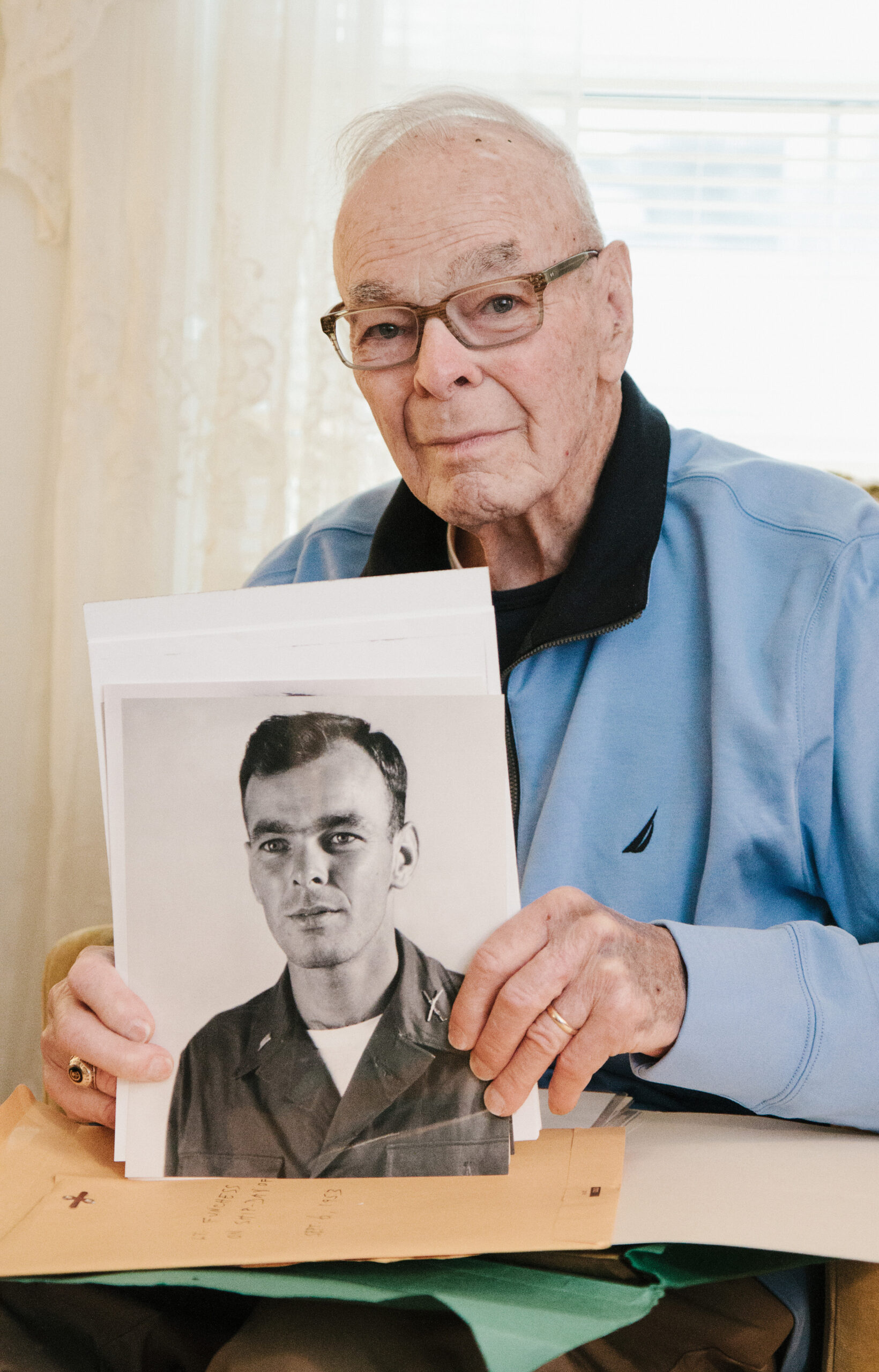
William led his platoon to a vantage point, hoping to confirm the reports were a mistake. Instead, he saw hundreds of enemy troops charging his position. “They were all in a fast trot. As they reached the river, they removed their shoes and clothing, held them above their heads, waded across the frigid, shoulder-deep water, and dressed again. In an instant, they were again in a fast trot,” said William.
Mortar and gunfire soon accompanied the attack, and before long, two men were helping a wounded William stumble up a mountainside in retreat. Suddenly, the man on William’s right was shot, and he fell back down the slope, taking William’s weapon with him. The G.I.s limped steadily on until they reached the edge of a deep canyon. They had two options: jump to certain death, or face the dozens of enemy soldiers forming a semi-circle around them. They decided to take their chances, and they surrendered.
As William shivered in the darkness,
he felt something in his chest pocket. It was a New Testament bearing the Gideon emblem.
William was searched by Chinese soldiers and added to the hundreds of prisoners of war (POWs) taken that day. As he sat among his fellow G.I.s, he contemplated the reality of his situation. “I realized many men in my platoon had either been killed or captured,” recalled William. “No immediate help and no counterattacks by the United States or South Korean armies were forthcoming. We were alone, and we were prisoners of a hostile enemy in a hostile country.”
As night approached, a bitter cold began to settle in. William shivered in the darkness, and as he clung to his thin summer jacket, he felt something in his chest pocket. It was a New Testament bearing the Gideon emblem, handed to him by an Army Chaplain shortly before he entered North Korea. The New Testament also included Psalms and Proverbs. “The first thing I did was open to Psalm 23,” said William. “When I was growing up, my mother always told me to read it when I was in trouble because it would give me a certain amount of peace and make me capable of handling any situation. I needed all the help I could get.”
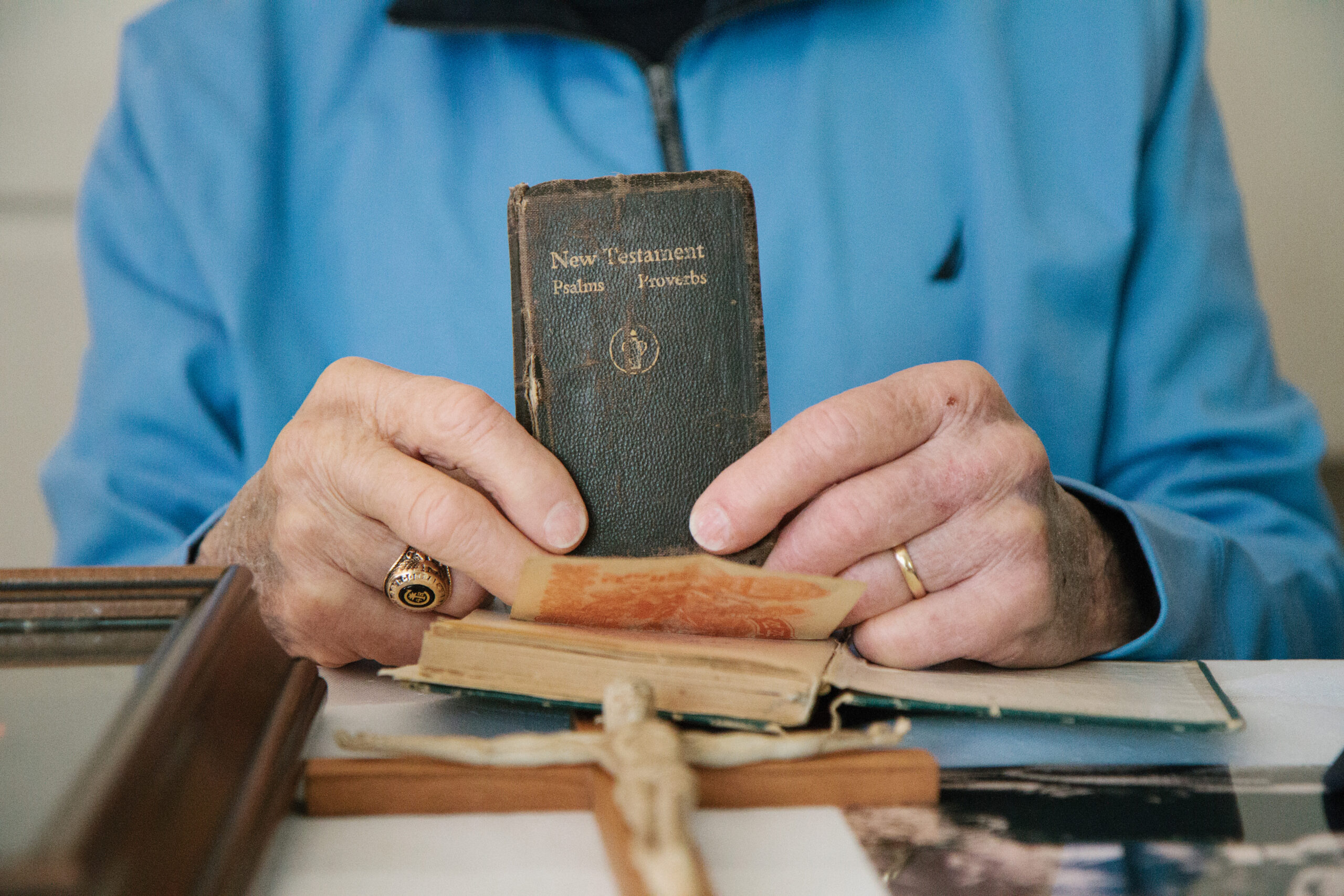
The POWs were forced to march north toward the city of Pyoktong. Snow was beginning to fall on the mountainous terrain, and the icy conditions made a hard journey all the more difficult. The bullet that tore through William’s right foot shattered several bones, and he struggled to keep up. “I fell hundreds of times. It wasn’t long before bruises covered both knees and both elbows. Frozen blood crusted both my sleeves and pant legs,” remembered William. “I was always the last man to enter the camp at night, but I knew that if I stopped they would execute me, and I wasn’t going to give up.”
The captives marched for seventeen nights before finally reaching their destination. It was a remote, snow-covered basin a few miles outside of Pyoktong. The only sign of civilization was a group of mud huts and shacks, which were connected by several dirt paths. The small community sat on the banks of the Yalu River. It was dark and uninviting, and the soldiers neither knew nor cared about the true name of the place.
They simply called it, “The Valley.”
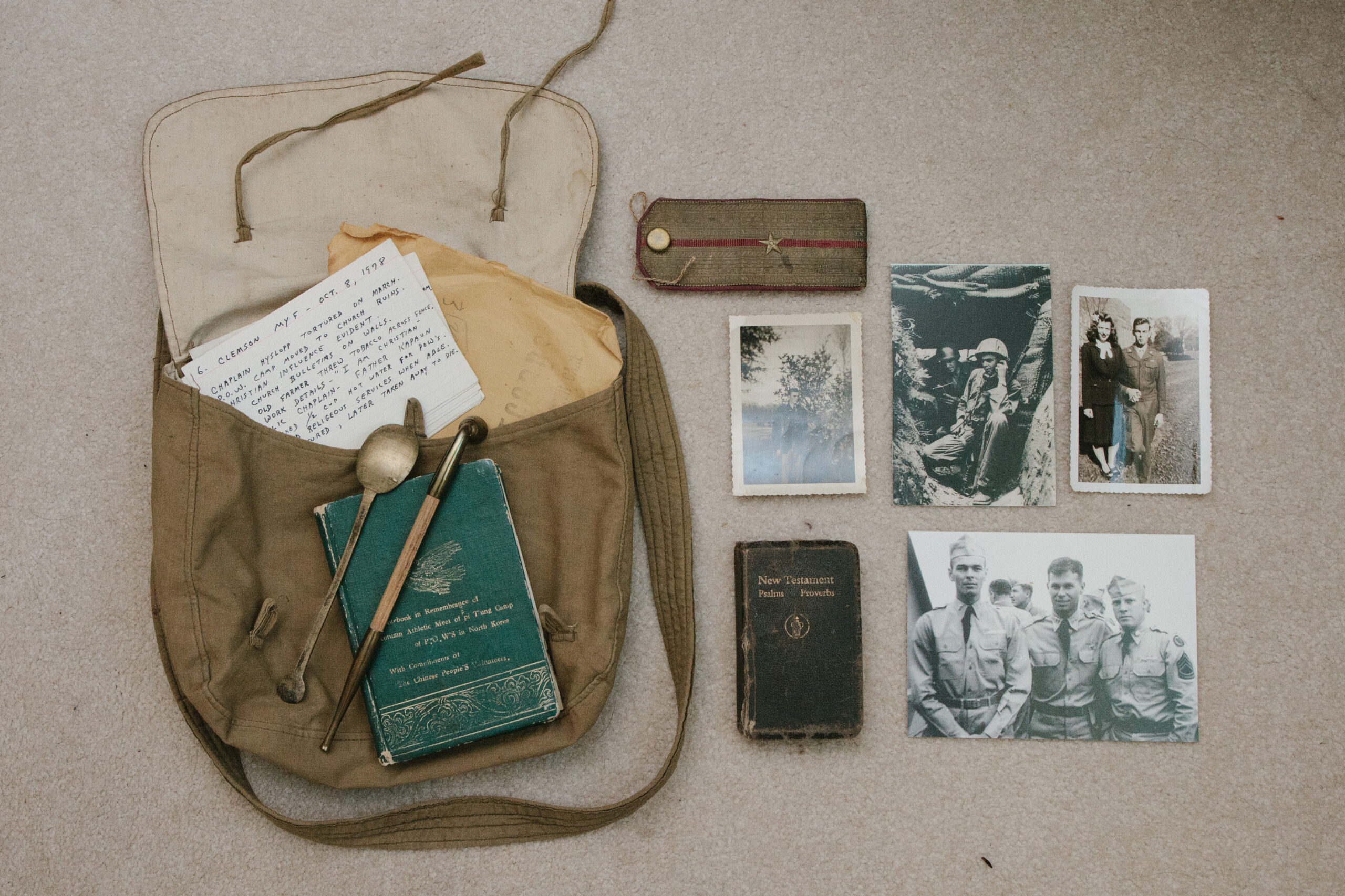
The POWs were divided amongst the dilapidated shacks. They found conditions to be primitive at best. There was no running water, no heat, and no blankets. Many men lost fingers and toes to frostbite. “There was nothing we could to do stay warm but to cling to each other,” recalled William. “Looking back, it’s a wonder any of us survived the first month.”
The shack that housed William also housed 11 other soldiers, all of whom were wounded. “They were the most downcast men I had ever seen. The men tried to be brave, but I heard sobbing at night,” he said. “Some called out for their mothers. There were screams when the wounds became too painful to bear. There were nightmares when they slept.”
As he lay among the men, William began to read from his New Testament. After a while, he asked the others if they would like him to read out loud. Each man replied with an enthusiastic yes, and William read Psalm 23 to the room. “When I finished, they asked, ‘please, read some more.’ So, I did.”
“I began to love my New Testament, and I was determined to not let the soldiers take it away from me.”
The words brought an extraordinary sense of peace to the room and somehow gave the men a respite from their suffering. William read to the soldiers every night, each time beginning with Psalm 23, and then continuing with other chapters in the New Testament. “Those men were so enthusiastic when I was reading. I began to love my New Testament, and I was determined to not let the soldiers take it away from me,” said William.
The Chinese soldiers often searched for and discarded anything they considered contraband. On two occasions, William watched as his New Testament flew out the door of his shack and landed on a pile outside. If he were caught retrieving it, it would mean sever punishment or possible death, but William didn’t care. “When the guards weren’t looking,” he said, “I gently slid the New Testament with my foot farther away from the pile and stood on it until the inspection was over. Then, I leaned over, feigning exhaustion, and placed it in my pocket.”
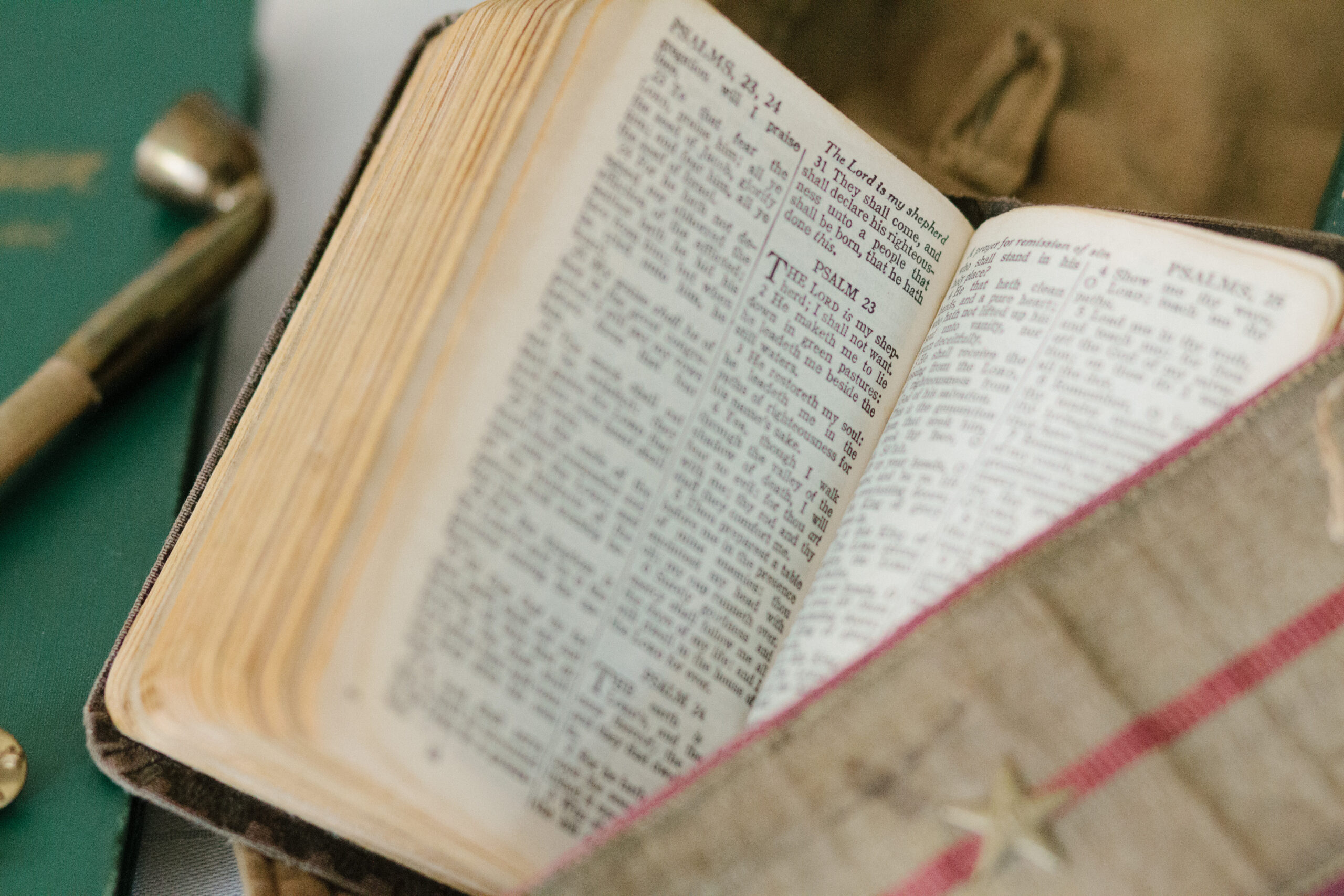
For William, his New Testament was more than just a book; it was a lifeline. He was held captive for 34 long and terrible months – nearly 3 years. He and his fellow prisoners suffered relentless interrogations, beatings, and humiliations. If they were able to walk, they were subjected to hard labor. Their diet consisted primarily of small portions of millet seed or sorghum. It wasn’t long before William weighed less than 100 pounds. The deplorable sanitary conditions were a breeding ground for vermin and lice, which soon found their way into beds, hair, and clothing. Many men attempted to escape. None succeeded.
“My New Testament was a connection to home, and more than that, it was a connection to God. It gave all of us a feeling of great comfort,” William remembered. The Scripture reminded him of an omnipotent God whose goodness and mercy supersedes all evil, even the hostility of his enemies. He was not forgotten, and he was not alone. God was with him. He was stripped of all worldly comforts and denied his freedom, but he had an eternal hope that gave him the strength to survive. In the moments when it seemed easiest to give up, he remained resilient.
The POWs attended mandatory propaganda sessions designed to intimidate them into renouncing their countries and their faiths. “The Communists suppressed Christianity in every way possible,” recalled William. “It was as if they felt their battle was half won if we stopped believing.” But their tactics fell short. “They would say, ‘Where is your God now? Why don’t you ask your God to feed you? If you asked Stalin or Moa Tse-Tung to feed you, perhaps you would not be starving.’ Not one man asked Stalin or Moa to provide food. I was proud of the American soldier.”
“My New Testament was a connection to home, and more than that, it was a connection to God. It gave all of us a feeling of great comfort.”
Usually, William sat quietly and patiently until the session came to a close. One day, however, the Chinese brought out large black and white photos of the mass graves at the City of Anak. “I went into that city before I was captured,” said William. “They kept shouting, ‘this is proof of the atrocities committed by the Americans!’ I took it as long as I could, but then I stood and shouted that it was a lie. They asked how I knew, and I foolishly responded that I was there, and I saw what happened.”
The repercussions were immediate. Two guards grabbed William and dragged him to an isolated building. They had him undress and stand at attention outside. Inside, several North Korean officers held a trial, and William was the defendant.
The results of the trial were a mystery until September 5, 1953. The war was over, and an Armistice Agreement had been signed in July. Both sides agreed to release POWs over the course of a thirty-day period, and September 5 was the last day. “Each day I listened for my name, and each day I was disappointed,” said William. “I asked an officer, and he said the release was over. I asked, ‘How could it be over? I am still here!’ He replied, ‘You are not a POW. You are a war criminal and you will not be released.’”
When William asked what he did, the officer responded, “Remember Anak?” Suddenly, it all made sense and William returned to his room, devastated. He had been found guilty of war crimes in Anak, even though he was innocent. What would happen now? He envisioned being locked in a dark prison, never to be seen or heard from again. But rather than dwell on those thoughts, he opened his New Testament and prayed for a miracle.
The next day, soldiers loaded him into the back of a truck. William was imagining where they might be taking him when the truck stopped abruptly, and he was ordered to get out. They shouted at him to start walking into an open field. “This is it,” thought William. He anticipated a bullet in the back or the detonation of a land mine at any given moment. Yet, he kept putting one foot in front of the other, until he noticed a United States Army ambulance and two uniformed men waiting for him. When he climbed in the back, one of them patted his back and said, “You don’t know how lucky you are, son. Last night both sides agreed to release war criminals.”
William smiled. He was free at last.
But rather than dwell on those thoughts, he opened his New Testament and prayed for a miracle.
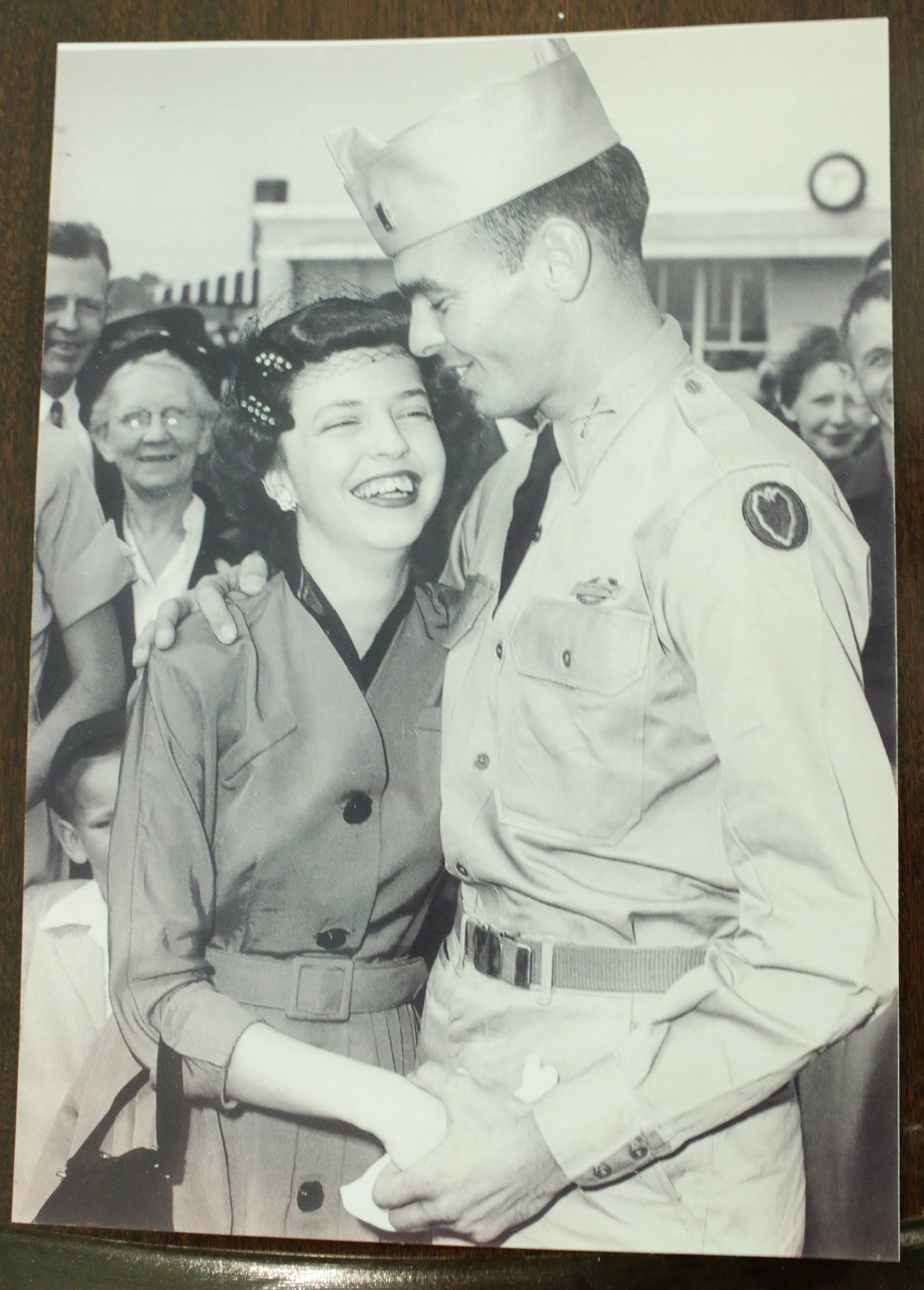 Sybil, William’s wife, excited to welcome him home
Sybil, William’s wife, excited to welcome him homeBy the time the plane carrying William home approached the airport in Columbia, South Carolina, a large crowd was gathered at the gate to welcome him home. In the front of the crowd, was Sybil. “She was wearing a bright red dress so I would be sure to see her, remembered William. “She was smiling and waving her hand.”
On January 20, 1954, the day after he was released from the hospital, William was separated from military service. “It was time to start a new life,” he said.
William went back to Clemson to earn his master’s degree in agronomy, and he worked over 30 years as a District Extension Leader and Associate Professor for the Clemson Extension Service. He and Sybil had three children, and they celebrated 67 wonderful years of marriage together before her passing in May 2017. In both hardship and happiness, William approached each circumstance with the same grit and faithfulness that saw him through his time as a prisoner of war. Today, he remains confident in the promise found in the New Testament and the assurance found in the words of Psalm 23:
The Lord is my shepherd; I shall not want.
He maketh me to lie down in green pastures: he leadeth me beside the still waters.
He restoreth my soul: he leadeth me in the paths of righteousness for his name’s sake.
Yea though I walk through the valley of the shadow of death, I will fear no evil:
for thou art with me; thy rod and thy staff they comfort me.
Thou preparest a table before me in the presence of mine enemies: thou anointest my head with oil; my cup runneth over.
Surely goodness and mercy shall follow me all the days of my life: and I will dwell in the house of the Lord for ever.
